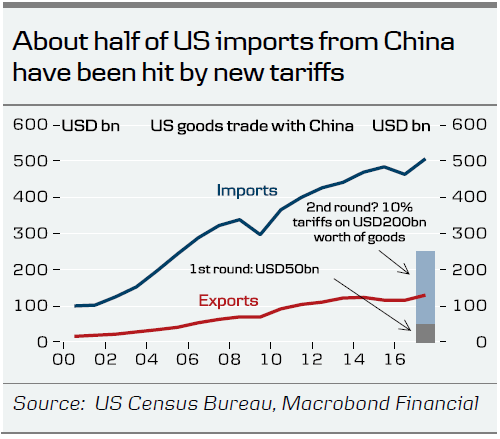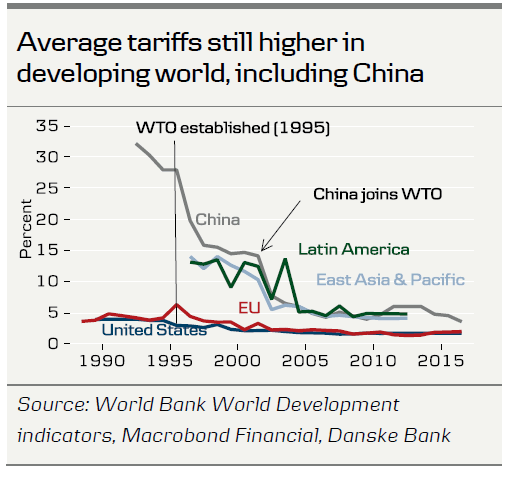Key points
- The tit-for-tat trade dispute between the US and China escalated this week.
- However, the market reaction was positive, as the actions were not as bad as expected.
- Indeed, both countries pushed for lower trade barriers (with other countries).
- While it will be a long and difficult path, we think a deal will be reached eventually.
- This may actually leave the world economy better off than before the whole trade dispute started.
This week saw an escalation in the tit-for-tat trade war between the US and China. First, on Monday, the Trump administration announced 10% tariffs on USD200bn worth of imports from China, taking the total imports from China hit by new tariffs to USD250bn, or roughly half of the total US imports from China. Chinese authorities responded relatively swiftly, announcing 5-10% of tariffs on USD60bn of imports from the US from 24 September. Clearly, a negative development for the sake of the world economy, as it increases uncertainty for companies and risks hurting global trade if these trade restrictions are made permanent.
However, the market reaction this week was very interesting. Instead of falling off the cliff, risk sentiment actually improved. For a start, the market was probably relieved that the new US tariffs were ‘only’ 10% and not 25% as Trump had signalled. And the Chinese response were also fairly moderate. This reversed some of the sell-off that EM currencies faced in the early summer when trade tensions escalated. On another note, despite threatening to decline the US’s invitation for further trade negotiations by the end of week if Trump proceeded with the new tariffs, the Chinese have still not called off these negotiations. Overall, this suggests that some caution is being exercised on both sides to not provoke the other side too much.
Furthermore, this week there were also pledges to reduce trade barriers towards other countries from both China and the US. While the US hit China with new tariffs, the Trump administration signalled a desire to push for bilateral trade agreements with Canada, Europe and Japan. Similarly, on Wednesday, China’s premier Li Keqiang said China plans to cut tariffs on imports from the majority of its trading partners next month (see Bloomberg). It is an interesting development, as China cut tariffs in July on a range of consumer goods. Both moves, if put into effect, would be good for the global economy. Finding a solution between China and US appears to be the biggest obstacle at this stage. We remain sceptical that a deal can be found before the US mid-term elections and think that genuine discussions will first start when the pain is felt on both sides. Along the way, there is a risk that the two sides might fail to reach a solution, and that the new higher trade tariffs become the ‘new normal’ or the conflict even escalates. However, we think that both sides will ultimately have a strong interest in finding an agreement. If such a deal includes scrapping the tariffs that have been put in place over the past months and moreover leads China to open up to more foreign investment and foreign trade (by actually lowering the average tariffs by more than before the trade dispute started), then the global economy may actually be better off. However, the road is likely to be long (lasting well into 2019) and is paved with uncertainty and market volatility.


